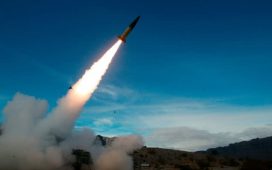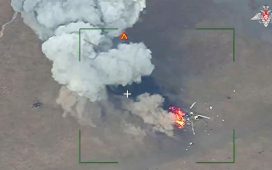Chad’s president Idriss Déby has died from wounds sustained in combat, the country’s military said on Tuesday, sending shockwaves through the region as rebel forces continued to advance on the capital N’Djamena.
The extraordinary announcement of the 68-year-old’s battlefield death came days after an election in which he won a sixth term in office, extending his 30-year, increasingly authoritarian rule. Some observers fear there might be extensive fighting in the strategically important central African country before a stable political settlement is reached.
Reports from N’Djamena suggested that parliament has been dissolved and the government replaced by a transitional military council led by Déby’s 37-year-old son Mahamat Idriss Déby Itno, a general.
In a statement on national TV, army spokesman Azem Bermendao Agouna issued a call for “dialogue and peace … to all Chadians in the country and abroad in order to continue to build Chad together”.
“The national council of transition reassures the Chadian people that all measures have been taken to guarantee peace, security and the republican order,” he said, surrounded by officers.
Timeline
Key dates in the life of Idriss Déby
Birth
Born Idriss Déby in Berdoba, in the north-east of Chad, to a herder. A Muslim, he hails from the Zaghawa ethnic group.
Early career
After enrolling at the officers’ academy in the capital N’Djamena in the early 1970s, he heads to France, where he trains as a pilot. Returns in 1979.
Army chief
Becomes army chief after Hissène Habré comes to power.
Coup claim
Accused by Habré of plotting a coup, he flees to Sudan, where he assembles an armed rebel group, the Patriotic Salvation Movement.
Takes power
Seizes control when his troops roll into N’Djamena.
Elections
After six years of democratic transition, elected head of state in Chad’s first multiparty vote.
Re-elected
Re-elected amid mounting criticism from the opposition over alleged electoral fraud and rights violations.
Mutineers
Army mutineers gather in the east of the country, where they form several armed groups.
Rebel advance
Rebels storm the capital, reaching the gates of the presidential palace before being repelled with help from French troops.
Intervention
Sends troops to support French intervention in northern Mali to oust jihadists.
Boko Haram
Launches regional offensive in Cameroon, Nigeria and Niger against Boko Haram jihadists.
Re-election
Re-elected for a fifth term amid opposition cries of electoral fraud.
Coup attempt
Escapes with the help of French bombardment an attempt to overthrow him led by rebels who have come in from Libya.
New role
Named field marshal, the first in Chad’s history, after he leads an offensive against Boko Haram.
Sixth term
Re-elected to a sixth term after elections on 11 April.
Death
The army says he dies from wounds sustained when commanding his forces as they fought rebels who had launched a major incursion into the north of the country on election day.
Agence France-Presse
The unrest has raised alarm bells among western countries, which saw Déby as an important ally in the fight against Islamist extremist groups, including Boko Haram in the Lake Chad Basin and groups linked to al-Qaida and Islamic State in the Sahel.
His death underlines the growing instability of the Sahel region, where a complex combination of economic, social, political and environmental factors is fuelling a series of crises.
Déby – who often joined soldiers on the battlefront in his military fatigues – had visited troops on the frontline on Monday after fast-moving columns of rebels from the Force for Change and Concord in Chad (Fact) crossed the northern frontier from their base in Libya and advanced south towards N’Djamena.
“Marshal Idriss Déby Itno, as he did each time that the institutions of the republic were gravely threatened, took control of operations during the heroic combat led against the terrorists from Libya. He was wounded during the fighting and died once repatriated to N’Djamena,” Bermendao said.

Regional diplomats and security officials said that, though details were unclear, it appeared the rebels had been stopped on Sunday by a government counter-offensive bout 200km north of the capital and forced to retreat.
The most recent information on Tuesday night was that the rebels had started to advance again once the news of Déby’s death was confirmed, the officials said. Though they remain many hundreds of kilometres from N’Djamena, they appear to be advancing rapidly. The army is divided and units may fight each other before taking on Fact forces, some observers said.
N’Djamena remained calm on Tuesday night but very nervous. Shops were being shuttered at the central Sog Galla market “in anticipation of chaos”, one resident told the Guardian.
Others in the city said many feared either an attack by the rebels or that fighting could break out between military units. Bridges and roads were jammed as some sought refuge in neighbouring Cameroon.
Déby took control of Chad in an armed rebellion in 1990. He was one of Africa’s longest-ruling leaders and a close ally of western powers battling Islamist militants in west and central Africa. But he has faced repeated insurgencies in the desert north and was also dealing with rising public discontent over his management of oil wealth and crackdowns on opponents.
A new constitution pushed through by Déby in 2018 would have allowed him to stay in power until 2033. Last year he took the title of Marshal and said before last week’s election: “I know in advance that I will win, as I have done for the last 30 years.”
The provisional election results announced on Monday gave the incumbent 79% of the vote.
A day before, the rebels said they had captured garrisons near Chad’s northern borders with Niger and Libya “without resistance”.
Fact is based in Libya, where it has a non-aggression pact with Khalifa Haftar, the military strongman who controls much of the country’s east. It was founded in 2016 by disillusioned former army officers and has accused Déby of repression. Mainly made up of the Saharan Goran people, it has clashed regularly with the Chadian army.
The Tibesti mountains near the Libyan frontier frequently see fighting between rebels and the army. French air strikes were needed to stop an incursion there in early 2019. In February 2008, a rebel assault reached the gates of the presidential palace before being pushed back with French backing.

Some analysts believe family succession and continuing presence of the military at the heart of power may reassure nervous allies such as France and the US.
“The swift announcement of the establishment of a military council and naming his son Mahamat as head of state … indicates regime continuity,” said Nathaniel Powell, author of a history of French military involvement in Chad.
“This probably aims to counter any coup-making efforts from within the security establishment and to reassure Chad’s international partners – especially France but also the United States – that they can still count on the country for its continued contributions to international counter-terrorist efforts in the Sahel.”
France had based its extensive Sahel counter-terrorism operations in N’Djamena. Chad, a former French colony, had announced in February the deployment of 1,200 troops to complement 5,100 French soldiers in the area.
One senior regional diplomat said that the naming of Déby’s son as interim president was problematical as the speaker of parliament should have taken power on his death according to the constitution.
“That in itself is a coup,” the diplomat told Reuters. “He has been grooming the son for some time. They will continue to face the rebellion. Déby had his hand in many things in the Sahel. His death disrupts things.”








